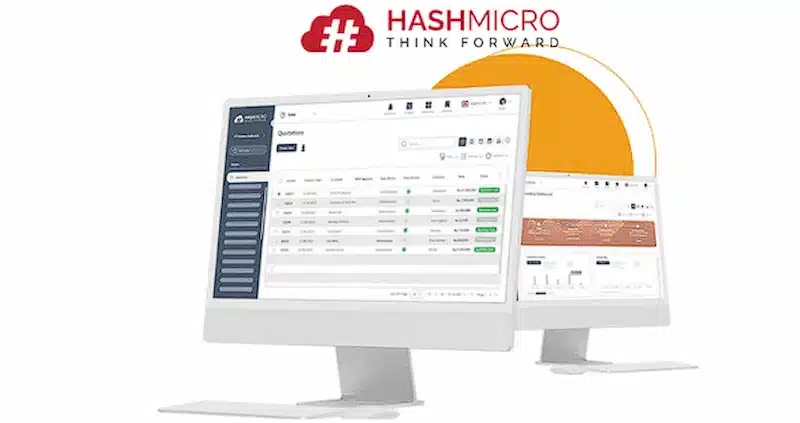Managing finances in construction is challenging, with fluctuating costs and complex budgeting. How can you track expenses accurately, prevent budget overruns, and ensure cash flow stability?
Studies in the Philippines show that strong financial management boosts profitability in construction firms. If the right accounting system can improve financial stability, why stick to manual cost tracking?
HashMicro’s Construction Accounting Software simplifies financial management with automated cost tracking, real-time reporting, and compliance management. Optimize your budgeting, control expenses, and maximize profitability with ease!
Ngunit paano nga ba nakakatulong ang isang construction-specific financial system sa mas maayos na paggastos, cash flow, at kita? Keep reading to find out!

Table of Contents
Key Takeaways
|
What is Construction Accounting?
Construction accounting is a specialized method of financial management designed to meet the unique needs of the construction industry. Unlike traditional accounting it focuses on tracking project costs, managing budgets, and ensuring accurate reporting throughout the lifecycle of a construction project.
This approach helps construction companies monitor expenses, assess profitability, and stay compliant with industry regulations. By managing financial data specific to each project, accounting for construction company ensures that costs are controlled, profits are maximized, and financial risks are minimized.
Why is Construction Accounting Important?

- Improved Financial Accuracy: Construction project accounting software helps record and track project costs in detail, thus minimizing recording errors. When this is integrated with construction estimating software and business budgeting software, it ensures more accurate and transparent financial reports.
- Real-Time Monitoring of Project Costs: With accounting software, companies can monitor project expenses in real time, making it easier to control the budget. This helps avoid uncontrollable cost overruns. Pairing construction accounting with construction scheduling software can further streamline project timelines.
- More Efficient Management of Multiple Projects: The accounting system enables the management of financial reports from multiple projects in a separate and organized manner. This makes it easier for companies to keep an eye on the financial performance of each project without confusion.
- Easier Compliance with Tax Regulations: Construction accounting systems make it easier for companies to comply with tax and audit regulations through more organized and complete reports. This reduces the risk of being penalized for tax or reporting errors.
Construction Accounting vs Regular Accounting: What’s the Difference?
Construction accounting and regular accounting share the same fundamental principles, but they differ significantly in their application due to the unique needs of the construction industry. The following table highlights the key differences between the two:
|
Aspect |
Construction Accounting |
Regular Accounting |
| Cost and Revenue Management | Manages project-based costs and revenues tied to timelines | Records periodic transactions without project focus |
| Budget Complexity | Tracks materials, labor, equipment, and changes in detail | Uses simpler, more predictable budgeting |
| Contract Recording | Maintains detailed records of project-specific contracts | Focuses on broader company contracts |
| Revenue Recognition | Applies methods like percentage of completion or completed contract | Recognizes revenue within standard periods |
| Operational Environment | Handles decentralized, site-specific operations with varying regulations | Operates in centralized, stable environments |
Construction Accounting Concept
To better understand the financial aspects of the construction industry, it is essential to grasp the core principles of construction project accounting, which are crucial for managing project costs, budgeting, and financial reporting, including the role of bonds in construction.
- Job costing: Job costing is the cornerstone of construction accounting. It involves tracking all costs related to a specific project, such as materials, labor, and equipment. This method ensures that businesses understand the profitability of each project and can make informed decisions about budgeting and resource allocation.
- Progress billing: Unlike many industries where payments are made after a product is delivered, construction projects often use progress billing. This means clients are invoiced at various stages of project completion. This concept helps contractors maintain a steady cash flow and ensures that payments align with the work completed.
- Retention accounting: Retention refers to a percentage of the payment that is withheld by the client until the project is fully completed and meets agreed-upon standards. Construction accounting carefully tracks these amounts to ensure they are correctly recorded and eventually released when due.
- Revenue recognition: Revenue recognition in accounting for construction company can be complex due to the long-term nature of many projects. Common methods include the percentage-of-completion method, where revenue is recognized as the project progresses, and the completed-contract method, where revenue is only recognized upon project completion.
- Change orders management: Construction projects often evolve with change orders, which alter the scope, timeline, or cost of the original agreement. Accurate accounting tracks these changes to ensure budgets remain realistic and clients are billed accordingly.
- Equipment and asset management: In construction, equipment like machinery and tools represent significant investments. Construction accounting involves tracking depreciation, maintenance costs, and usage to ensure these assets are efficiently utilized and accurately accounted for in financial statements.
- Overhead allocation: Overhead costs, such as office rent, insurance, and administrative salaries, must be distributed appropriately across different projects. Proper overhead allocation helps businesses understand the true cost and profitability of each job.
- Compliance and tax considerations: The construction industry is subject to specific regulations, including payroll taxes for subcontractors and compliance with local labor laws. Construction accounting ensures businesses stay compliant while optimizing tax strategies.
Read more: Top Construction Inventory Management Software
Types of Accounting Used in Construction
Understanding the types of accounting used in construction is essential for ensuring accurate financial management and maintaining control over complex projects. Each approach serves a specific purpose tailored to the unique demands of the industry:
- Job cost accounting: This type of accounting focuses on tracking all costs related to individual construction projects. It helps contractors manage project budgets, monitor spending, and ensure profitability for each job.
- Cash basis accounting: Cash basis accounting records revenue when cash is received and expenses when they are paid. This simple method is often used by smaller construction companies for its straightforward approach.
- Accrual basis accounting: Accrual accounting recognizes revenue and expenses when they are earned or incurred, regardless of when cash is exchanged. This method provides a more accurate financial picture for larger construction companies.
- Percentage-of-completion accounting: Common in long-term construction projects, this method recognizes revenue and expenses proportionally as the project progresses. It ensures that income is recorded throughout the project, providing a more consistent financial overview.
- Cost allocation accounting: This type focuses on distributing indirect costs, such as overhead and administrative expenses, across multiple projects. It ensures accurate job costing and profitability analysis.
Key Aspects of Accounting Software for Construction
One of the unique things that distinguishes construction accounting from regular accounting is the way revenue is recognized. In accounting for construction, revenue is recognized based on the percentage of project completion, so the company can record revenue along with the project. This is in contrast to ordinary accounting which tends to recognize revenue once the transaction is fully completed.
Accounting for construction companies also focuses more on individual project management. Because each project has a budget that must be tracked separately. Accounting for construction company must ensure that every expense and revenue is recorded correctly, so that financial management is more detailed and focused.
Another uniqueness is in terms of financial reporting. Accounting for construction company often involves specialized reports that show financial progress per project, such as project cost reports that help project managers monitor the financial health of each project in real-time.
Difficulties and Tips in Making Accurate Construction Accounting
Although accounting for construction companies can indeed make it easier for management to manage finances, implementing construction project accounting cannot be said to be easy. What are the difficulties that will be faced to make accounting for construction companies difficult to do?
Here are the difficulties of implementing accounting for construction and tips on how to overcome them:
1. Fluctuating income
You must be aware that the construction industry often faces volatile revenues as projects can run for a long time, with payments made in stages. These fluctuations make financial recording and cash flow difficult to predict, which can affect the company’s ability to manage its day-to-day finances.
How can we overcome this?
To overcome this challenge, it is important for companies to carefully plan their cash flow. One tip is to make monthly cash flow estimates based on project payment milestones. That way, companies can anticipate when revenue will come in and prepare emergency funds in case of payment delays.
2. Changes in project demand and specifications
Construction projects often experience mid-course specification changes, such as redesign or material changes. This affects the project budget and schedule, making it difficult for the accounting team to maintain accurate and up-to-date financial reports.
How can we overcome this?
To overcome this, construction companies need to be more flexible in budgeting. Make sure every project change is recorded in detail in the financial system. By using a accounting for construction company application that has an automatic update feature, any changes can be immediately reflected in the financial statements without having to repeat the calculation from the beginning.
3. Difficulty in recording projects by stages
On construction projects, it is often the case that work is carried out in stages. Financial records must reflect the progress of the work, including the revenue received and costs incurred for each stage of the project. This difficulty is further increased when the project is protracted or split into many phases.
How can we overcome this?
One solution is to apply the percentage of completion method in the financial statements. This method allows companies to record revenue and costs based on the percentage of work completed, which makes the financial statements more accurate and in line with the actual progress of the project.
4. Constraints in managing construction tax
Construction projects have more complex tax requirements compared to other businesses. Apart from income tax, there are also material and subcontractor taxes that need to be managed. Mistakes in tax management can expose the company to fines or penalties.
How can we overcome this?
The solution is to ensure the finance team has a deep understanding of the tax regulations that apply in the construction sector. In addition, it is important to consult regularly with a tax consultant to ensure the company always complies with the latest regulations. By doing so, the risk of mistakes and potential fines can be avoided.
5. Complex project cost management
In accounting for construction companies, managing project costs can be challenging as it involves many aspects, such as materials, labor, equipment, and overhead costs. Differences in project duration and scale can also lead to costs that are difficult to predict, complicating real-time monitoring of project budgets.
How can we overcome this?
To overcome this, construction companies need to have a structured and detailed cost recording system. One example of a high-quality system that you can use is HashMicro’s accounting system. HashMicro’s system is one of the best accounting software Philippines and is designed to meet various accounting needs, one of which is accounting construction.
Furthermore, the HashMicro system also comes with a comprehensive range of features and extensive flexibility. One of the features offered is Multi Level Analytical.
This feature provides insight into all financial transactions in real-time and can be filtered based on various categories. This helps management know the construction financial activities that involve various aspects, such as building materials, operational money, employee salaries, and others.
Not only does HashMicro provide comprehensive features, it also provides a free demo that gives enthusiasts the opportunity to try and understand how the system works without being charged.
Common Mistakes in Construction Accounting
Errors in construction accounting can lead to financial losses, project delays, and damaged relationships with clients and stakeholders. Below are common mistakes that construction businesses should avoid, along with explanations of their impact:
1. Disorganization
Lack of proper organization in accounting records can result in misplaced invoices, untracked expenses, and incomplete financial data. This can cause errors in budgeting, compliance issues, and difficulties in tracking project profitability.
Implementing a systematic record-keeping process and using accounting software can help maintain order and ensure accurate reporting.
2. Poor Cost Estimation
Inaccurate cost estimation during the planning phase can lead to unexpected expenses and diminished profits. Estimating errors often arise from inadequate data, overlooked variables, or failure to account for potential risks.
Detailed analysis, historical data, and contingency planning are critical to creating reliable job cost estimates.
3. Inaccurate Recognition of Joint Ventures
In construction projects involving joint ventures, improperly accounting for shared costs, revenues, and responsibilities can cause financial disputes and compliance issues. Businesses must ensure clear agreements and accurate financial tracking for all parties involved. Adopting consistent methods for allocating costs and revenue is essential.
4. Incorrect Overhead Calculations
Overhead costs, such as administrative expenses and equipment depreciation, are often miscalculated or overlooked. Incorrect calculations can distort project profitability and affect pricing strategies.
Regularly reviewing and updating overhead cost allocations ensures accurate financial reporting and fair project pricing.
5. Mishandled Change Orders
Change orders, which alter the scope of a project, are common in construction but often poorly tracked. Failing to document and account for change orders can lead to unbilled work and disputes with clients.
Establishing a clear process for approving, tracking, and billing change orders is crucial for avoiding financial discrepancies.
6. Unreasonable Contract Terms
Agreeing to contract terms that are unfavorable or unclear can expose businesses to significant financial and legal risks. For instance, payment delays, unexpected liabilities, or unrealistic deadlines can harm cash flow and operations.
Thoroughly reviewing contracts and negotiating fair terms protect the company’s interests and sustainability.
Financial Statements Specific to Construction Accounting
In construction project accounting, certain financial statements are tailored to address the industry’s unique complexities. These specialized reports are designed to provide accurate, actionable data that reflects the dynamic nature of construction projects.
Below are key financial statements that are essential for construction businesses to track progress and make informed decisions:
1. Work-in-Progress (WIP) schedule
The WIP Schedule is crucial in tracking the financial status of ongoing construction projects. It provides a detailed snapshot of costs incurred and revenue earned and helps identify project overruns or underruns, aiding financial decision-making for active projects.
2. Construction-in-Progress (CIP) report
The CIP Report tracks the financial data of projects still in progress, including costs and revenues. It offers a clear picture of ongoing expenses and cumulative revenues, enabling construction companies to assess project profitability and detect potential financial risks early.
3. Job cost sheets
Job Cost Sheets are essential for tracking the costs associated with individual construction jobs. By providing a detailed breakdown of expenses and comparing actual costs to budgeted amounts, they allow construction companies to monitor budget adherence and make real-time adjustments.
4. Profit and Loss (P&L) statement
The P&L Statement consolidates a project’s revenues and expenses, offering insight into its profitability. For accounting for construction company operations, this statement provides stakeholders with a clear understanding of financial performance.
5. Balance sheet
The Balance Sheet in construction accounting reflects tangible assets, liabilities, and unique items like retentions, advances, and construction equipment. This statement is crucial for understanding the financial position of a construction company, including project-specific financing.
These financial statements in construction project accounting are not only vital for tracking financial health but also crucial for informed strategic decisions, enabling construction companies to stay on top of their financial performance and achieve sustainable growth.
4 Construction Accounting Best Practices for Contractors
1. Emphasize Precise Job Costing
-
Monitor and document every cost related to a project, including workforce, materials, and indirect expenses.
-
Use comprehensive job costing statements to compare actual expenditures with budgeted amounts and pinpoint opportunities for enhancement.
-
Motivate all staff to appreciate the significance of exact job costing and its role in boosting overall profitability.
-
Consider employing construction accounting software featuring clear and user-friendly coding systems for each task and expense category.
2. Select the Appropriate Accounting Approach
-
Cash basis accounting is a favored choice for smaller enterprises because of its simplicity and straightforward depiction of the company’s cash flow.
-
Accrual basis accounting delivers a more detailed perspective on a company’s financial status but involves more sophisticated bookkeeping.
-
Contractors managing large-scale projects often apply the percentage of completion method to record revenue and costs throughout the project duration, helping to stabilize income fluctuations.
-
Residential construction firms may find the completed contract method advantageous, postponing revenue recognition and tax obligations until the project concludes.
3. Identify the Optimal Tax Strategy
Various factors influence your tax responsibilities, including your revenue recognition approach, project classification, and organizational structure.
-
Large contracts: Most contractors utilize the percentage of completion method, acknowledging revenue and expenses over the life of the project.
-
Residential construction projects: You might adopt the completed contract method, recognizing income and costs only upon project finalization, potentially deferring tax payments.
-
Business structure: Evaluate the tax consequences of your entity type. Pass-through entities such as sole proprietorships or certain LLCs permit deducting business losses against personal income tax.
4. Invest in Construction Accounting Software
Contemporary construction accounting platforms automate all monotonous job costing activities, streamline financial oversight, and support tax compliance. Look for features such as:
-
Project monitoring and analytics: Obtain real-time data on project progress and overall financial health.
-
Management of accounts receivable and payable: Guarantee prompt collections and foster strong vendor relationships.
-
Flexibility in revenue recognition: Accommodate various methods commonly utilized in the construction sector.
Achieve Error-Free Construction Accounting with HashMicro System
As we mentioned earlier, HashMicro AI accounting software is one of the best construction accounting software Philippines that you can use to be able to overcome the difficulties of working on accounting for construction companies. Yes, it has extensive customization options and integration with construction project management software, so it can meet all your construction-specific needs.
The following are the features of the HashMicro accounting system that can help with accounting for construction:
- Cash Flow Reports: Monitor the company’s cash inflows and outflows to ensure sufficient liquidity, make proper financial planning, and identify and address potential financial issues.
- Budget S Curve: This feature helps visualize the progress of project or budget expenditure in the form of an S curve.
- Financial Statement with Budget Comparison: Provides a clear picture of how the company’s actual financial performance matches the plan to identify deviations and make necessary adjustments to achieve financial goals.
- Forecast Budget: Predict future budgets based on historical data to help plan finances, allocate resources efficiently, and make better strategic decisions.
- Bank Reconciliation – Matches internal records with bank statements to identify discrepancies and ensure accuracy. Integration with bank reconciliation software enables automatic data import, real-time matching, and faster error detection.
Also, the system has no limit on the number of users. What can you benefit from that? With no limit on the number of users, the accounting process in construction can be supervised by several people at once, ensuring compliance with accounting principles. This will increase the transparency of the construction accounting process.
Conclusion
Construction accounting is a specialized field that focuses on the unique financial aspects of construction projects. Unlike general accounting, construction accounting involves specific variables and processes tailored to the industry.
Because of these differences, accounting for construction also has its own difficulties. One way to overcome these difficulties is to use an accounting system, such as HashMicro’s Accounting System.
HashMicro’s system is crafted to meet the diverse needs of construction businesses, offering scalable solutions that adapt to industry growth. It integrates seamlessly with other systems, like asset management, facility management, and construction management software.
Schedule a free demo to discover how this system can streamline your construction project and enhance efficiency!

FAQ About Construction Accounting
-
What type of accounting is used in construction?
Construction companies often use job costing, percentage-of-completion, and completed-contract methods. These approaches are designed to suit the distinct characteristics of construction projects, enabling businesses to track project expenses, recognize revenue over time or at project completion, and handle long-term contracts efficiently.
-
How do you account for construction?
Accounting for construction involves several specialized practices. These include tracking project-specific costs (job costing), managing revenue recognition based on the stage of completion or contract terms, and preparing detailed financial reports such as work-in-progress (WIP) schedules. Proper accounting ensures accurate budgeting, cash flow management, and compliance with industry regulations.
-
How to record construction expenses?
Construction costs are typically categorized into three main groups: labor, materials, and overhead. Within these categories, companies often use cost codes to track specific expenses, such as different types of materials, and assign each cost to a particular construction project. When allocating overhead expenses, most businesses first determine their total overhead and then distribute it as a percentage of the project’s labor and material costs.
-
What is the best accounting software for construction?
For construction businesses, HashMicro’s financial management software streamlines accounting processes and addresses industry-specific challenges. It provides up-to-date data access for users both in the office and on-site. The system accommodates diverse contract arrangements, such as time and materials, and automates revenue recognition and compliance with relevant tax regulations.
-
What is construction in progress?
Construction in progress (CIP) accounting is a method used to track costs related to ongoing construction projects before they are completed and classified as fixed assets. This approach ensures that expenses such as labor, materials, and overhead are properly recorded until the project is finalized and transferred to the appropriate asset account.
-
How is a building recorded in accounting?
A building in accounting is recorded as a fixed asset on the balance sheet once construction is complete. The cost includes expenses such as materials, labor, permits, and professional fees. Over time, the building undergoes depreciation to account for wear and tear.
-
What is building in accounting?
In accounting, a building refers to a tangible asset that a company owns and uses for business operations. It is classified under property, plant, and equipment (PPE) and depreciated over its useful life to reflect its decreasing value.
-
How does construction bookkeeping differ from general bookkeeping?
Construction bookkeeping involves tracking project-specific costs, progress billing, and job costing, which differ from traditional bookkeeping. It requires detailed financial records for each project to ensure accurate cost allocation, budgeting, and profitability analysis.
-
What is the formula for construction accounting?
A key formula in construction accounting, particularly for the percentage-of-completion method, is:
Revenue Recognized = (Costs Incurred to Date ÷ Total Estimated Costs) × Total Contract Revenue
This formula calculates the proportion of revenue that should be recognized based on the progress of the project, ensuring financial statements accurately reflect the current status of the work.














































